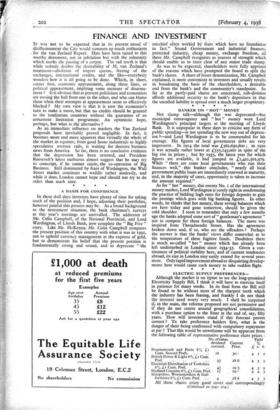FINANCE AND INVESTMENT
IT was not to be expected that in its present mood of disillusionment the City would summon up much enthusiasm for the van Zeeland Report. Hats have been raised to this worthy document, not in jubilation but with the solemnity which marks the passing of a corpse. The sad truth is that 'while nobody doubts the desirability of M. van Zeeland's treatment—abolition of import quotas, freeing of the exchanges, international credits, and the like—everybody wonders how it is all going to be done. Which, in short, comes first, economic appeasement, along these lines, or political appeasement, implying some measure of disarma- ment? It is obvious that at present politicians and economists are tossing the ball from one to the other, and who can blame them when their attempts at appeasement seem so effectively blocked ? My own view is that it is now the economist's turn to make a move, but that no credits should be granted to the totalitarian countries without the guarantee of an armament limitation programme. An optimistic hope, perhaps, but what is the alternative ?
As an immediate influence on markets the Van Zeeland proposals have inevitably proved negligible. In fact, it becomes more and more apparent that virtually the whole of the market in equities, from good home industrials to highly speculative oversea rails, is waiting for decisive business news from America. So far, there is no conclusive evidence that the depression has been arrested, and President Roosevelt's latest outbursts almost suggest that he may try to conscript, if he cannot cajole, the co-operation of Big Business. Still dominated by fears of Washington, the Wall Street market continues to waddle rather aimlessly, and while it does, London cannot hope and should not try to do other than mark time.














































 Previous page
Previous page